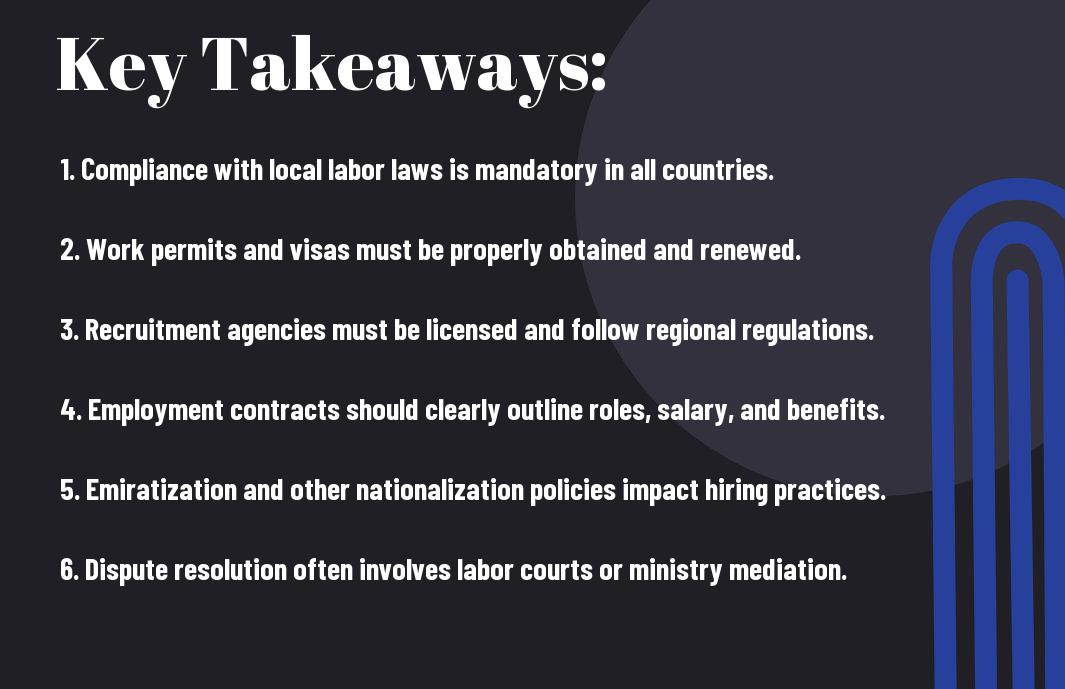Most individuals seeking job opportunities in the Middle East often encounter a complex legal landscape that can be challenging to navigate. Understanding the legal employment services available to you is imperative for ensuring your rights are protected and for smooth integration into the workforce. This blog post explores into the various legal employment services in the region, providing you with valuable insights and guidance to help you make informed decisions as you pursue your career aspirations in this dynamic market.
Overview of Legal Employment Services
While the legal landscape in the Middle East continues to evolve, so does the demand for streamlined and effective legal employment services. These services are designed to assist legal professionals in navigating the complexities of the employment sector, ensuring compliance with local laws and regulations while providing necessary support for both employers and employees. As you explore these services, you’ll find a wide range of offerings tailored to meet the specific needs of the legal community in this dynamic region.
Definition and Purpose
At its core, legal employment services encompass a variety of practices aimed at bridging the gap between legal professionals and employment opportunities. These services often include recruitment, consultancy, and advisory roles, ultimately designed to facilitate a seamless hiring process. By engaging with these services, you ensure that your rights as a legal professional are protected while also being informed about the expectations of potential employers.
Additionally, legal employment services help organizations comply with employment laws and regulations, mitigating risks associated with hiring. Whether you are a lawyer seeking new opportunities or an employer looking for qualified legal talent, these services enable you to make informed decisions that align with your professional goals.
Types of Legal Employment Services
Around the Middle East, various types of legal employment services cater to the needs of legal professionals and firms alike. Some of the most common types include:
| Type | Description |
|---|---|
| Recruitment Firms | Connects legal professionals with job opportunities in firms and corporations. |
| Consulting Services | Provides expert advice on employment practices and legal compliance. |
| Career Coaching | Offers guidance in career development, including resume preparation and interview techniques. |
| Temporary Staffing | Fills immediate legal staffing needs on a temporary or project basis. |
| Continuous Legal Education | Facilitates ongoing training and professional development for legal practitioners. |
Thou can significantly benefit by understanding these services, as they play a vital role in optimizing your career path within the legal sector. Legal employment services not only help you in securing opportunities but also equip you with the tools necessary for navigating the intricacies of a competitive market.
Also, delving deeper into the services offered, you might find even more specialized options available to meet your unique needs:
| Specialization | Details |
|---|---|
| Law Firm Placement | Targeted efforts to match candidates with law firms. |
| Corporate Counsel Recruitment | Focuses on filling in-house legal positions for corporations. |
| International Law Services | Assists with legal jobs that involve cross-border engagements. |
| Legal Technology Roles | Help candidates enter the growing field of legal technology. |
| Policy and Regulation Advisory | Guidance on legal changes that might affect employment opportunities. |
Thou can enhance your prospects significantly by utilizing the specialized knowledge contained within these services, ensuring that you are always ahead in the competitive landscape of legal employment. By leveraging these options, you solidify your position as a sought-after legal professional in the Middle East.
Regulatory Framework in the Middle East
It is vital for businesses and individuals considering employment in the Middle East to understand the complex regulatory framework that governs labor relations. Each country in the region has its own set of labor laws and regulations, affecting everything from working hours and conditions to dispute resolution and termination procedures. Familiarizing yourself with these laws will not only ensure compliance but also enhance your capacity to navigate the unique workplace cultures that exist across diverse nations within the Middle East.
Labor Laws and Regulations
One of the key components of the regulatory framework in the Middle East is the labor laws that dictate the employer-employee relationship. These laws typically encompass various aspects, including contract stipulations, wage entitlements, working hours, and employee rights. Depending on the country, you may find variations in the treatment of expatriates versus local workers, and it’s important to understand these distinctions to protect your interests effectively.
Compliance and Enforcement
Along with understanding labor laws, you must also appreciate the compliance and enforcement mechanisms that underpin these regulations. Various governmental departments and labor ministries are charged with overseeing compliance, and they often conduct inspections to ensure that businesses adhere to local laws. By staying informed about your obligations as an employer or employee, you can mitigate the risk of legal challenges and foster a healthy working environment.
Compliance is not merely about adhering to the letter of the law; it also involves understanding the broader context of labor rights and responsibilities. This could mean engaging with labor unions or workers’ rights organizations to ensure that the workplace is not only compliant with legal standards but also supportive of employee welfare. Staying proactive in your compliance efforts can lead to better employee satisfaction and productivity, ultimately contributing to the success of your business or career in the Middle East.

Key Players in Legal Employment Services
If you are venturing into the legal employment sector in the Middle East, understanding the key players involved is necessary for navigating the landscape effectively. These players can be broadly categorized into government agencies and private sector firms, each playing a significant role in shaping the legal job market. Your journey in legal employment services will often intertwine with these entities, influencing your opportunities and pathways within the industry.
Government Agencies
Agencies dedicated to overseeing employment and labor laws in the Middle East are fundamental to the legal employment services. These governmental bodies are responsible for creating regulations that govern workplace practices, ensuring compliance among employers, and providing resources for job seekers. As you engage with these agencies, you may find valuable information on employment rights and legal standards that directly impact your career choices in this region.
Private Sector Firms
An integral aspect of legal employment services involves the influence of private sector firms, which cater to a variety of clients seeking legal expertise. These firms range from multinational corporations to local boutique practices, all of which play a role in shaping the employment landscape. By connecting with private sector firms, you can access invaluable insights into industry trends, job openings, and the requisite skills sought after in the legal market.
Further exploring into this domain, private sector firms not only provide legal services but also serve as significant employers within the legal profession. They often conduct recruitment drives, host internship programs, and offer mentorship opportunities that can enhance your qualifications and improve your employability. Establishing relationships with these firms can prove advantageous as they frequently seek individuals who are well-versed in both local and international legal landscapes.
Challenges in Legal Employment Services
Your experience in navigating legal employment services in the Middle East can be complex due to various challenges that arise. These challenges can affect not only how effectively you access opportunities but also how you conform to the unique legal landscapes of different countries within the region. Understanding these hurdles is vital for making informed decisions about your employment journey.
Cultural and Economic Barriers
Along your journey, you may encounter cultural and economic barriers that impact your ability to secure legal employment. The Middle East is a tapestry of diverse cultures, and navigating this landscape requires an understanding of local customs, practices, and business etiquette. If you are not familiar with the prevailing attitudes toward foreign workers or the specific qualifications required in a particular country, you may face difficulties in finding suitable employment.
Additionally, economic factors, such as fluctuating job markets and competition for positions, can further affect your prospects. Many countries in the region have a high demand for specialized legal services, yet the oversupply of qualified professionals can make it challenging for you to stand out. Understanding these cultural nuances and economic conditions is vital in positioning yourself effectively in the job market.
Legal and Administrative Hurdles
On top of cultural and economic barriers, you are likely to encounter various legal and administrative hurdles when pursuing employment in the Middle East. Each country has its own specific regulations concerning work permits, residency requirements, and qualifications that must be met before you can legally work within its borders. This can create a complicated maze for you to navigate, particularly if you are unaware of the necessary policies or procedures.
Further complicating your path is the need for compliance with local labor laws, which can differ significantly from your home country. You may find that certain certifications or legal qualifications are required to practice in a specific jurisdiction, necessitating recognition of your credentials or even additional examinations. This not only extends the timeline for you to secure employment but also requires thorough research and careful planning to ensure that you meet all the criteria set forth by local authorities. Therefore, being proactive in understanding these legal and administrative hurdles is vital for your successful transition into the regional job market.
Trends and Developments
Not only has the legal employment landscape in the Middle East transformed in recent years, but it continues to evolve rapidly in response to global economic conditions and local regulatory changes. You may find that these shifting dynamics necessitate a deeper understanding of employment law to navigate successfully. Employment law innovations are specifically designed to protect both employees’ rights and employers’ interests, ensuring a balance that promotes workplace harmony while complying with increasingly complex regulations. This holistic approach is vital for the sustainability of businesses within the region.
Innovations in Employment Law
Between changes in labor code regulations and adaptations geared towards international standards, your organization may benefit from understanding the latest innovations in employment law. For instance, many Middle Eastern countries are now implementing provisions that support flexible work arrangements, parental leave, and combat discrimination. These developments not only promote fairness and equality in the workplace but also contribute to attracting and retaining top talent in a competitive market.
Impact of Technology on Legal Services
Impact is a term that encapsulates the sweeping changes brought on by technology in legal services across the Middle East. You will observe that legal firms are increasingly adopting digital platforms and tools to streamline various processes, making legal services more accessible and efficient. As technology evolves, the integration of artificial intelligence and machine learning can enhance research capabilities, improve client interaction, and ensure compliance with local laws and regulations, thereby reshaping the way legal employment services are delivered.
Developments in technology are creating a ripple effect, encouraging law firms to innovate and adapt their service offerings. This not only enhances efficiency but also allows you, as a potential client, to access legal expertise in a more streamlined manner. Virtual consultations, digital documentation, and online case management systems are just some of the technological advancements that make legal services more user-friendly. This shift not only saves you time but also ensures that you receive timely and relevant legal advice tailored to your specific needs. Understanding these developments can empower you to make informed decisions in your legal employment journey.
Best Practices for Employers and Employees
Now, understanding the importance of solid employment contracts is not just beneficial; it is crucial for a successful working relationship. In the Middle East, where labor laws can be complex and vary by country, having a clear, well-structured employment contract helps protect both you and your employer. Ensure that your contract outlines your job role, salary, work hours, and any additional benefits or allowances. Pay particular attention to the details regarding termination, probation periods, and dispute resolution processes, as these can greatly impact your experience. Engaging with legal advisors or employment specialists during this stage can clarify any uncertainties and reinforce your position in the workplace.
Navigating Employment Contracts
Across various industries in the Middle East, employment contracts serve as the foundation of the employer-employee relationship. It’s important to read and understand your contract thoroughly before signing it, as this document is binding and will govern your employment terms. If there are elements that are ambiguous or concerning, do not hesitate to discuss these with your employer or seek legal consultation. This proactive approach enables you to clarify expectations right from the start, leading to a more harmonious work environment.
Rights and Responsibilities
Around the Middle East, knowing your rights and responsibilities in the workplace is fundamental for both employees and employers. You are entitled to a safe working environment, fair remuneration, and the right to express concerns without fear of retaliation. On the other hand, you also carry the responsibility to fulfill your job duties as outlined in your contract and to adhere to the policies of your workplace. Upholding these rights and responsibilities enhances your professional reputation and contributes positively to your career trajectory.
But it’s crucial to understand that both rights and responsibilities can differ greatly depending on the laws of each country in the Middle East. Familiarizing yourself with local labor laws would equip you better to advocate for your rights when necessary while also ensuring you meet your duties as an employee. This balance between understanding and compliance can significantly mitigate potential conflicts that may arise during your employment journey.

To Wrap Up
As a reminder, leveraging legal employment services in the Middle East can significantly enhance your job search and career trajectory. These services provide not only access to a broader range of job opportunities but also professional guidance in navigating the complex legal landscape of the region. By utilizing the expertise of legal recruitment firms, you can ensure that your qualifications and experiences are effectively showcased to potential employers, giving you a competitive edge in a fast-evolving market.
Moreover, understanding the specific employment laws and regulations in various Middle Eastern countries is crucial for your career growth. Legal employment services can help you grasp these intricacies, ensuring that you remain compliant while pursuing your professional endeavors. By engaging with these services, you position yourself to take full advantage of the unique opportunities this vibrant region offers, ultimately leading to a more rewarding and successful career path.





